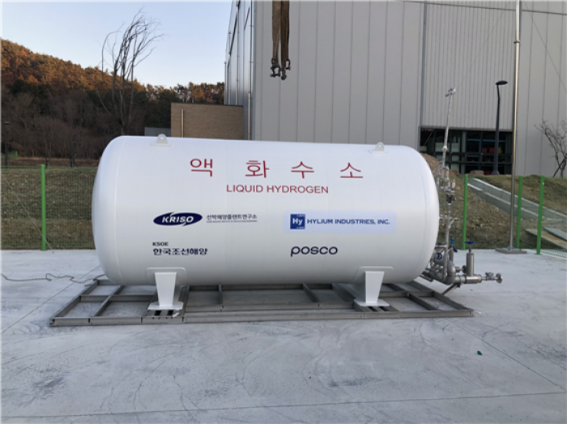Hylium, KRISO, POSCO receive initial approval for liquid hydrogen storage tanks
Two types of the maritime liquid hydrogen fuel tank have been certified; 316L stainless steel and 316HN stainless steel models
By Jan 12, 2022 (Gmt+09:00)
Samsung steps up AR race with advanced microdisplay for smart glasses


When in S. Korea, it’s a ritual: Foreigners make stops at CU, GS25, 7-Eleven


Seoul-backed K-beauty brands set to make global mark


Maybe Happy Ending: A robot love story that rewrote Broadway playbook


NPS yet to schedule external manager selection; PE firms’ fundraising woes deepen



Hylium Industries Inc. announced Wednesday that it has been granted an approval in principle (AIP) by the Korean Register for two types of jointly developed liquid hydrogen fuel tanks for ships. The Korea Research Institute of Ships and Ocean Engineering (KRISO,) POSCO, and Korea Shipbuilding and Offshore Engineering (KSOE) developed the storage products together with KRISO.
The AIP attainment serves as the first step in building the hydrogen-powered shipbuilding industry in South Korea.
The Korean Register certified two types of the maritime liquid hydrogen fuel tanks -- one made of 316L stainless steel and another of 316HN stainless steel.
The 316L stainless steel is a common austenitic stainless steel that can be directly applied to the production of liquid hydrogen storage containers that need to be maintained at a temperature as low as -253 Celsius. The 316HN stainless steel, developed by POSCO, is a next generation steel that further solves the hydrogen embrittlement problem commonly faced in production of liquid hydrogen storage containers.
In addition to the designing stage, the four companies have completed the first prototype of the 400kg capacity liquid hydrogen fuel tank for ships made of 316L stainless steel at the KRISO Offshore Industries R&D Center in Geoje.
Going forward, KRISO, POSCO, KSOE, and Hylium Industries will promote commercialization of liquid hydrogen-powered ships. The alliance plans to demonstrate the new eco-friendly ships, as well as build an R&D shipbuilding infrastructure, in Mokpo City, South Jeolla Province.
"Developing liquid hydrogen storage tanks involves cutting edge technology," KRISO President Kim Booki said. "The breakthrough was possible due to four institutions aiming for a shared goal."
Hylium Industries’ CEO Kim Seo Young said, “The future of hydrogen in maritime applications is very bright. We are honored to aid the decarbonization of the Korean shipbuilding industry and the development of the hydrogen economy in the country.”
Write to Jee Abbey Lee at jal@hankyung.com
-

-

-
 ElectronicsNow, slim is in – and Samsung aims to be No. 1 with Galaxy S25 Edge
ElectronicsNow, slim is in – and Samsung aims to be No. 1 with Galaxy S25 EdgeMay 09, 2025 (Gmt+09:00)
-

-
 Electric vehiclesBYD’s Atto 3 overtakes Tesla’s Model Y as best-selling EV in South Korea
Electric vehiclesBYD’s Atto 3 overtakes Tesla’s Model Y as best-selling EV in South KoreaMay 09, 2025 (Gmt+09:00)


